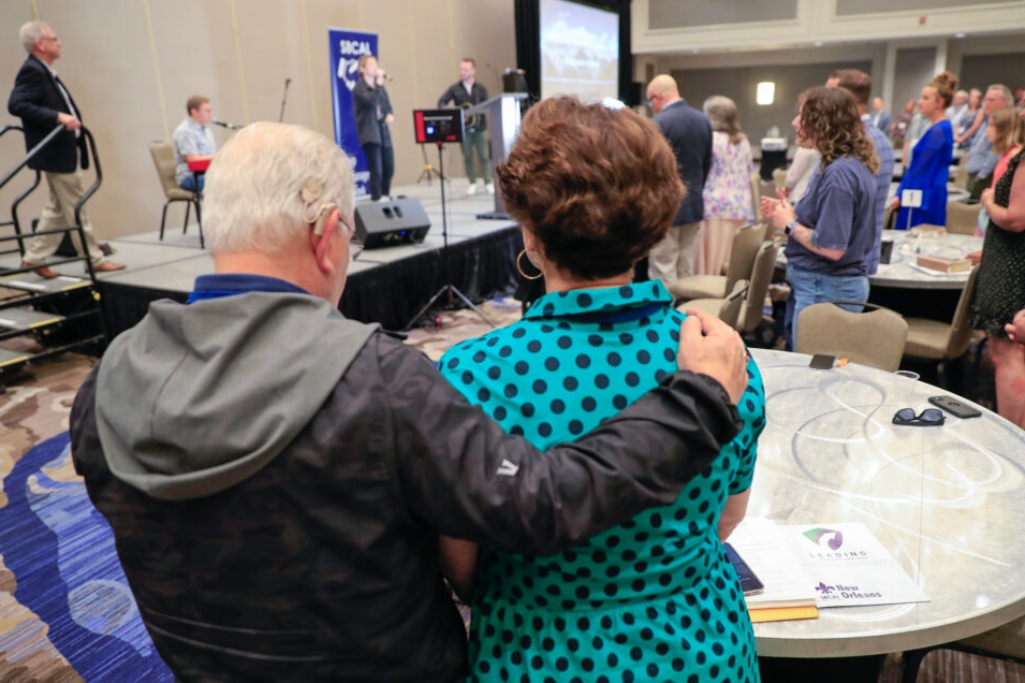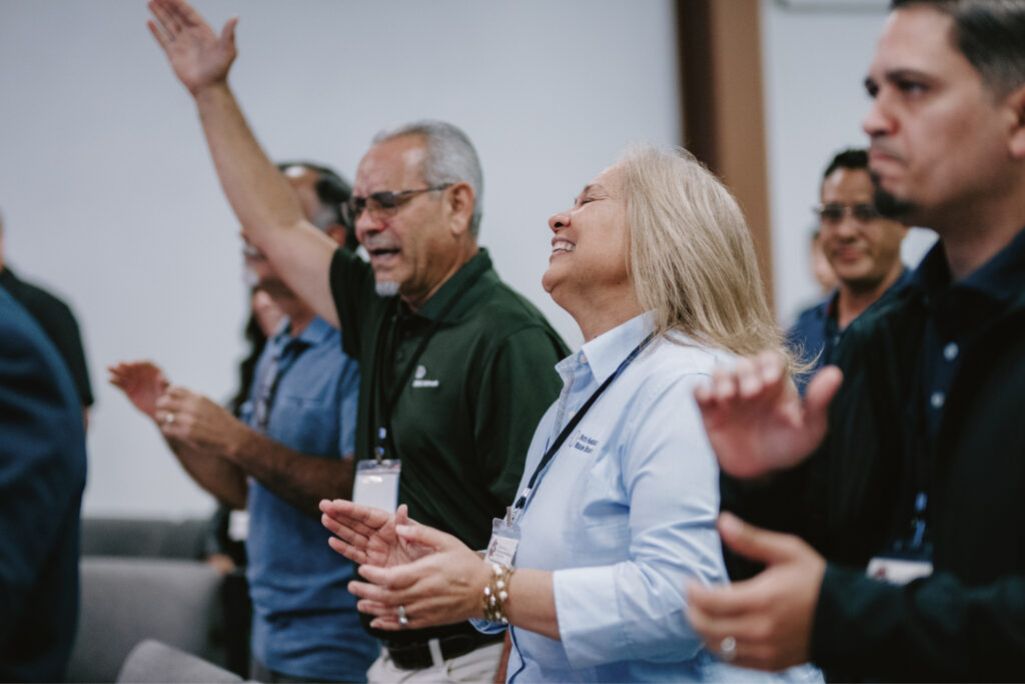
Associational leaders and their wives enjoy a rare moment of worshiping together June 11, 2023, at the Southern Baptist Conference of Associational Leaders annual conference at the Marriott in New Orleans.
NASHVILLE (BP) — Southern Wisconsin has seen God move over the past 18 years. In 2005, the Southern Wisconsin Baptist Association, headquartered in Madison, had 13 churches. Today it has 36, thanks to church planting and new affiliations.
Partnerships and trust were key ingredients in the associational resurgence. Director of Missions Mark Millman also serves as a church planting catalyst with the North American Mission Board (NAMB), forging strong ties between the association and the SBC. Partnerships with other associations across the nation yield prayer support, ministry volunteers and resources for Southern Wisconsin Baptists. Those partnerships include associations in Texas, Ohio and Georgia. As a result, lives are being changed in Wisconsin churches.
The Southern Wisconsin Association illustrates a larger trend, according to Millman.
“I’m around enough people to know, and I feel like there’s an upward trend” among Southern Baptist associations, Millman said. “I really have seen associations thrive across the country.”
As the SBC observes the Day of Prayer for Associational Missions Oct. 22, associational leaders throughout the convention say a resurgence of associations has given local Baptist cooperation an increasingly visible and relevant role in SBC life.
Twenty years ago, the relevance of associations was not a given. Several associational leaders told Baptist Press they recall meetings where national SBC leaders predicted the demise of associations. Skepticism toward associations lingered into the 2010s, indicated by a 2017 study that found “nothing” was the most common answer when Baptist leaders were asked to describe the most exciting aspect of their local Baptist association.
Finances can be a challenge for associations as well. SBC-wide data on associations is difficult to come by, in part because not all state conventions ask about associational giving on the Annual Church Profile (ACP). But in Alabama, a state whose ACP does ask about associational giving, churches’ reported gifts to local Baptist associations have declined 29 percent over the past 20 years—from $13.9 million in 2002 to $9.9 million last year. Those figures likely do not include all gifts to associations, and a lower percentage of churches submitted their ACP in 2022 than in 2002. Still, the challenges for associations are evident.
“Off and on through the last 20 years or more, people have said there are three levels of cooperation in SBC life—association, state and national—and that at some point in the future there may not be three. There may only be two,” said Ray Gentry, president of the Southern Baptist Conference of Associational Leaders (SBCAL). “The two were going to be the state convention and the national.”
But the predictions of associations’ demise have not materialized. One encouraging sign is the growth of SBCAL, a professional cohort of associational mission strategists.
Today’s SBCAL membership is the largest at any time since the group’s inception in 1960. More than 570 associational leaders are members out of approximately 1,100 associations. They meet for an annual conference preceding each year’s SBC Annual Meeting. They also produce resources and webinars and host ongoing ministry cohorts to help associational leaders refine their skills.
Gentry thinks he knows why associational cooperation is making a comeback. For one, God is using SBCAL resources “to really raise the bar of what is an effective associational leader.” A benchmark resource was the conference’s 2020 book, edited by Gentry, The Baptist Association: Assisting Churches. Advancing the Gospel. The book built on a 2018 study of associations’ work in SBC life, which identified 17 competencies of effective associational leaders.
“Many changes have taken place in associational missions in recent years,” said Steve Laughman, associational mission strategist for the Centennial Baptist Association in Thomaston, Ga. “Associations and associational leaders who are not willing to change will find themselves hurting and ineffective. But those who have embraced what SBCAL has found to be the essentials—the 17 proficiencies of an effective associational leader—have adapted and are generally thriving because they are serving their churches well.”
Another factor in the comeback of associations is that they foster trust among Baptists in an era when it can be in short supply. Social media reflects differences over mission strategies, SBC entity leadership, SBC presidential elections and how the Convention should respond to sexual abuse. Yet people on opposite sides of those issues find themselves talking and cooperating in local associations.
“Pastors in an association may have disagreements on national convention issues,” Gentry said. “Yet they know each other and they love each other locally, so it really causes, in most cases, pastors and churches in the local association to work together well and to bridge those divides that seem to be on the national level.”
Bob Bumgarner, lead missional strategist for First Coast Churches, the Baptist association in Jacksonville, Florida, agrees. The personal relationships in an association draw in churches and pastors, he said.
“In an environment of declining trust and skepticism about institutions,” Bumgarner said, “there really is something magnetic about being able to pick up the phone and call someone who will answer the phone, know your name and situation and empathetically listen to you, and then practically offer assistance through the network.”
Back in Wisconsin, Millman thinks a resurgence of associations may be the key to spiritual renewal across the SBC. He notices the shift in attitude toward associations, and he has seen it pay dividends.
Associations are “biblical,” Millman said. “Two are better than one. A three-corded strand is not quickly broken. I’ve experienced it for 18 years” as an associational leader. “Even when I was a staff member for the 12 years I worked in churches, my go-to guy was always the association guy. I always felt like he had the most perspective and the best voice in my life.”
(EDITOR’S NOTE – David Roach is a writer in Mobile, Ala.)


